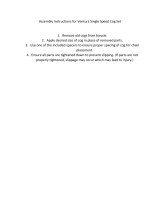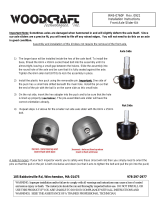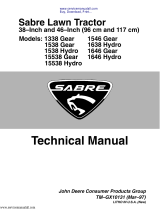
TABLE OF CONTENTS
Section Page
Foreword .............................................................................................................................. 1
Description and Operation ................................................................................................. 2
Introduction .................................................................................................................................................. 2
General Description ..................................................................................................................................... 2
Hydraulic Schematic .................................................................................................................................... 3
External Features - ZT-2200) (EZT
®
) ....................................................................................................... 4
External Features - ZT-2100 ........................................................................................................................ 5
Technical Specications ............................................................................................................................... 6
Product Identication ................................................................................................................................... 7
Safety .................................................................................................................................... 8
Personal Safety ............................................................................................................................................ 8
Tool Safety ................................................................................................................................................... 8
Work Area Safety ......................................................................................................................................... 8
Servicing Safety ........................................................................................................................................... 8
Troubleshooting .................................................................................................................. 9
Service and Maintenance.................................................................................................. 10
External Maintenance ................................................................................................................................ 10
Service and Maintenance Procedures ....................................................................................................... 10
Fluid Volume and Level .............................................................................................................................. 10
Fluid Change Procedure .............................................................................................................................11
Purging Procedures ................................................................................................................................... 12
Return to Neutral Setting ........................................................................................................................... 13
How To Use This Section ...................................... 14
General Instructions .............................................. 14
Transaxle Removal ............................................... 14
Limited Disassembly ............................................. 14
Tools and Torques ................................................. 15
Hub Replacement ............................................ 16-17
Control Arm and Bypass Arm ............................... 18
Seal Kit Replacement ........................................... 19
Cog Brake Assembly ............................................ 20
Disc Brake Assembly ............................................ 21
Side Cover ........................................................... 22
Axle Shaft, Gears and Expansion Plate....... ......... 23
Motor Shaft ........................................................... 24
Input Shaft and Bypass Rod ................................. 25
Hydraulic Components .....................................26-30
Transaxle Installation ............................................ 30
Assembly After a Complete Teardown.................. 30
Sealant Application ............................................... 31
Schematic and Parts List .................................32-33
Glossary of Terms ....................................................................................................... 56, 57
How To Use This Section .....................................35
General Instructions ............................................. 35
Transaxle Removal .............................................. 35
Limited Disassembly ............................................ 35
Tools and Torques ................................................36
Hub Replacement ................................................ 37
Expansion Tank .................................................... 38
Control Arm and Bypass Arm .............................. 39
Seal Kit Replacement ..........................................40
Cog Brake Assembly ........................................... 41
Side Cover .......................................................... 42
Axle Shaft and Reduction Gears....... ................... 43
Motor Shaft ..........................................................44
Input Shaft and Bypass Rod ................................ 45
Hydraulic Components ................................... 46-50
Transaxle Installation ........................................... 50
Assembly After a Complete Teardown................. 51
Sealant Application .............................................. 52
Schematic and Parts List ............................... 54-55
ZT-2200 Repair............................................14 ZT-2100 Repair...........................................35























